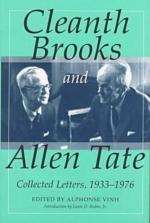|
This section contains 2,923 words (approx. 10 pages at 300 words per page) |

|
Cleanth Brooks is usually identified with one method, "close reading," and with a search for such devices as paradox and irony in English poetry from Shakespeare to Yeats. He has been accused of "critical monism" by R. S. Crane [see excerpt above]. (p. 196)
[I want] to make a plea for Cleanth Brooks as a historian of criticism, as a critic of critics. His comments on criticism constitute an extensive part of his work that has not received the attention it deserves. (p. 197)
Much of Brooks's comment on other critics is, no doubt, self-defense, apologia pro domo sua. He knows that criticism is, as Benedetto Croce knew and so said repeatedly, "criticism of criticism." In criticizing others, Cleanth Brooks defines his own position, sometimes clarifying or modifying it in the context of the history of criticism or with rival currents of literary theory in this century. But his criticism...
|
This section contains 2,923 words (approx. 10 pages at 300 words per page) |

|


